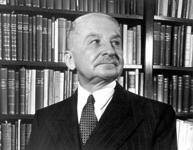 |
| English: Karl Popper in 1990. (Photo credit: Wikipedia) |
irreconcilable – it is possible that a solution may be found in appealing to a higher level of abstraction. In this case we look to Karl R. Popper's formalization of the scientific method in the following schema (Popper, 1972, 119):
P1 → TT → EE → P2Where P1 is the initial problem state, TT is a tentative solution or theory, EE is the error-elimination process applied to the theory, and P2 represents the new problem state that has been generated by the process. This concise representation is simply that of a Darwinian or evolutionary approach to knowledge.
In this discussion our focus is on the error-elimination step. If one thinks of Popper's formulation as "the method", the error-elimination step may be modified as circumstances warrant without altering that method. Popper also referred to this step as "attempted elimination through critical discussion" (1999, 13-4). To acquire new knowledge, we always use this method, substituting the appropriate critical component.2 With this understanding we may actually suggest that Bruce Caldwell is a methodological monist, as he specifically states that his reason for supporting methodological pluralism is that theories require different forms of criticism (Caldwell, 1982, 1-2).
 |
| English: Ludwig von Mises in his library (Photo credit: Wikipedia) |
explicity identifying and defending its axioms as synthetic rather than analytic, has tied it more closely to the real world. This clarification has increased the credibility of the approach even though tentative theories, in Popper's view, need no justification. To illustrate Mises's emphasis on criticism we offer the following quote:
Man is not infallible. He searches for truth – that is, for the most adequate comprehension of reality as far as the structure of his mind and reason makes it accessible to him. Man can never become omniscient. He can never be absolutely certain that his inquiries were not misled and that what he considers as certain truth is not error. All that man can do is submit all his theories again and again to the most critical reexamination. This means for the economist to trace back all theorems to their unquestionable and certain ultimate basis, the category of human action, and to test by the most careful scrutiny all assumptions and inferences leading from this bases to the theorem under examination. It cannot be contended that this procedure is a guarantee against error. But it is undoubtedly the most effective method of avoiding error. (Mises, 1966, 68)The critical component in the method is composed of the examination of premises and validation of logic.
When viewed in this more abstract light, Mises's method fits Popper's formulation and does not contradict methodological monism. This fact is comforting as we suspect that the idea that there is only one fundamental method of obtaining knowledge is itself an a priori truth.
In a previous post we suggested that Mises was incorrect in claiming that economics was a subject unconnected with any other science, linking the action axiom with Popper's suggestion that "all life is problem solving" and to the science of biology. Here we have claimed that Mises's method fully complies with the scientific method as formulated by Popper, and that it is only the use of an appropriately different approach to error elimination or criticism that differentiates it from the physical sciences. If we have succeeded in our project it seems clear that economic methodology, as described and practiced by Ludwig von Mises, is scientific, and that the resulting discipline of economics is science.
Footnotes
1 See (Blaug, 1992, 42-47), (Wilson, 1998), and (Cziko, 1995).2 I am grateful to Rafe Champion for bringing this point home.
3 For Mises's discussion of his method see (2003), (1966, 1-142), (1969) and (2006). For discussions by others, see (Boettke, 1998), (Boettke, 2012), (Kirzner, 2001, 69-92), and (Selgin, 1990, 11-18),
4 Mises recognized the observational, i.e. synthetic, component of his axiom (Kirzner, 2001, 88-9).
Bibliography
Blaug, M. (1992). The Methodology of Economics: Or how economists explain (2nd ed.). Cambridge: Cambridge University Press.Boettke, P. J. (1998). Ludwig von Mises. In J. Davis, D. W. Hands, & U. Mäki (Eds.), The Handbook of Economic Methodology (pp. 534-40). Aldershot: Edward Elgar Publishing. Retrieved October 24, 2013, from http://papers.ssrn.com/sol3/papers.cfm?abstract_id=1531088
Boettke, P. J. (2012). Was Mises Right? In P. J. Boettke, Living Economics: Yesterday, today, and tomorrow (pp. 192-212). Oakland, California: The Independent Institute.
Caldwell, B. (1982). Beyond Positivism: Economic Methodology in the Twentieth Century. London: George Allen & Unwin.
Cziko, G. (1995). Without Miracles: Universal Selection Theory and the Second Darwinian Revolution. Cambridge, MA: The MIT Press.
Kirzner, I. M. (2001). Ludwig von Mises. Wilmington, Delaware: ISI Books.
Mises, L. v. (1966). Human Action: A treatise on economics (3rd ed.). Chicago: Henry Regnery.
Mises, L. v. (1969). Theory and History: An interpretation of social and economic evolution. New Rochelle, New York: Arlington House.
Mises, L. v. (2003). Epistemological Problems of Economics (3rd ed.). Auburn, Alabama: Ludwig von Mises Institute.
Mises, L. v. (2006). The Ultimate Foundation of Economic Science: An essay on method (2nd ed.). Indianapolis, Indiana: Liberty Fund.
Popper, K. R. (1957). The Poverty of Historicism. Boston: The Beacon Press.
Popper, K. R. (1972). Epistemology Without a Knowing Subject. In K. R. Popper, Objective Knowledge: An Evolutionary Approach (pp. 106-52). Oxford: Oxford University Press.
Popper, K. R. (1999). The logic and evolution of scientific theory. In K. R. Popper, All Life is Problem Solving (pp. 3-22). London: Routledge.
Selgin, G. A. (1990). Praxeology and Understanding: An analysis of the controversy in Austrian economics. Auburn, Alabama: Ludwig von Mises Institute.
Smith, B. (1996, Spring). In Defense of Extreme (Fallibilistic) Apriorism. Journal of Libertarian Studies, 12(1), 179-192.
Wilson, E. O. (1998). Consilience: The Unity of Knowledge. New York: Alfred A. Knopf.

No comments:
Post a Comment